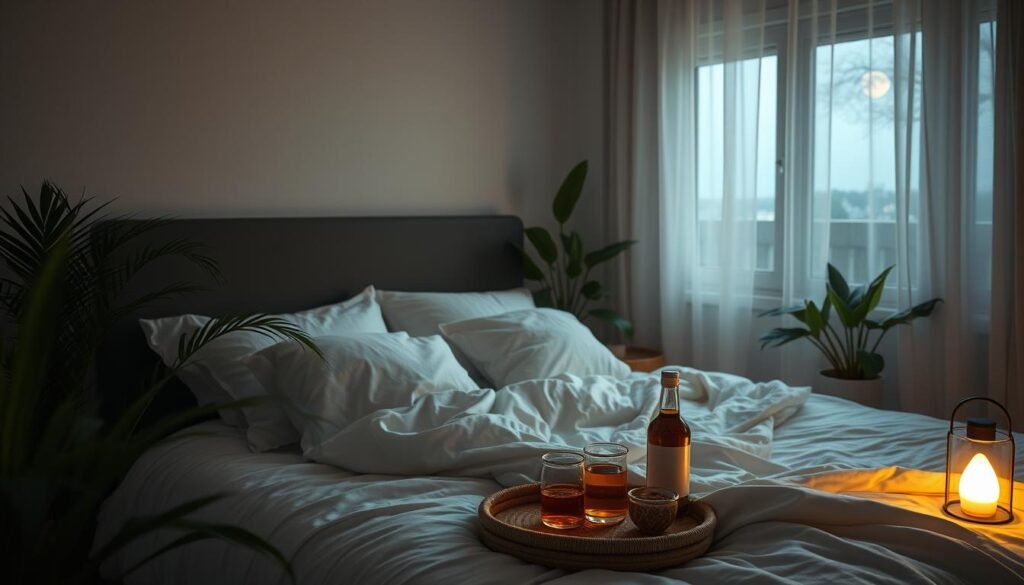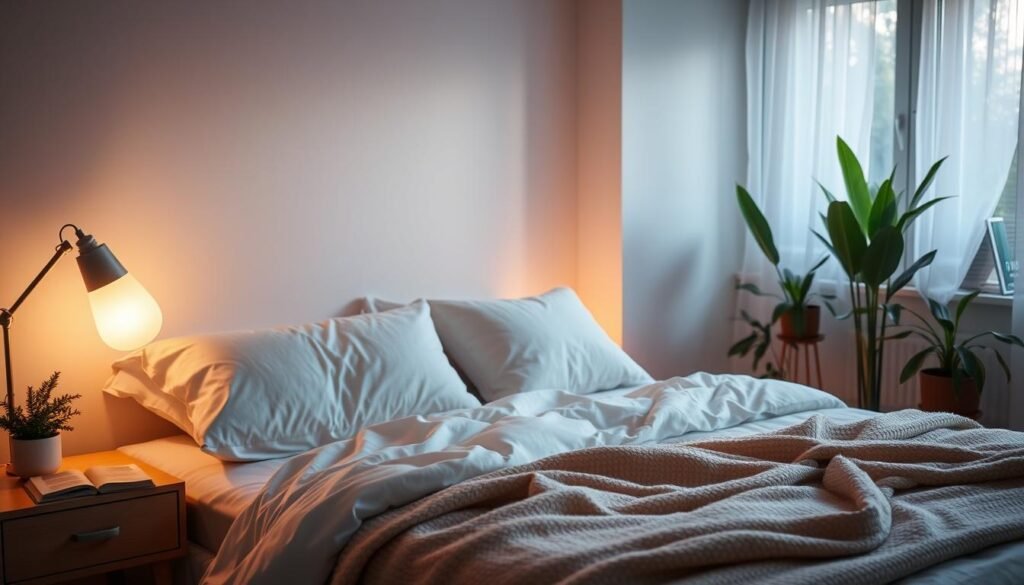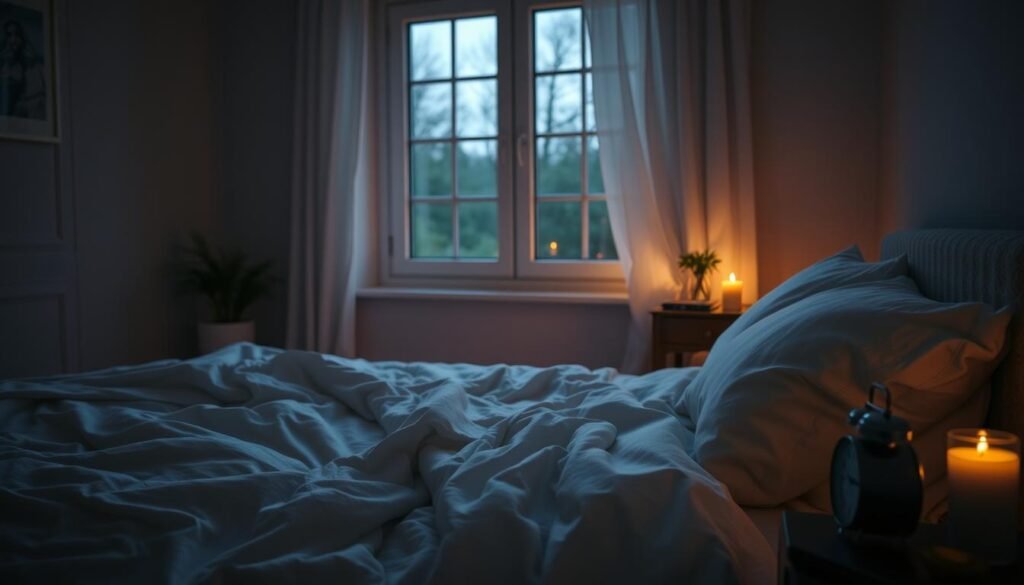Did you know that up to 70 million Americans battle chronic insomnia? The Centers for Disease Control and Prevention reports this. Chronic insomnia disrupts sleep at least three nights a week for three months or more. It’s not just annoying; it can lead to severe health problems. But, there’s hope. There are many ways to manage chronic insomnia and get back to sleeping well at night.
This piece will share key tips and strategies, including how to treat sleep disorders and the benefits of Cognitive Behavioral Therapy for Insomnia. With these methods, people can gain control over their sleep. This can really improve their life.
Key Takeaways
- Chronic insomnia affects millions of Americans and can lead to serious health issues.
- Effective management includes understanding symptoms and types of insomnia.
- Cognitive Behavioral Therapy for Insomnia is often recommended as a primary treatment option.
- Healthy sleep habits and lifestyle changes play a crucial role in managing insomnia.
- Addressing psychological and medical factors is vital for effective sleep disorder treatment.
Understanding Chronic Insomnia
Chronic insomnia makes it hard to fall asleep, stay asleep, or causes early wake-ups. This happens at least three nights a week for over a month. Between 10% to 15% of people face this issue, affecting their daily life and mental health. Those with insomnia often feel tired, moody, and struggle with daily tasks.
Definition and Symptoms of Insomnia
Knowing chronic insomnia means understanding its symptoms. Common problems include:
- Difficulty falling asleep
- Frequent awakenings during the night
- Waking up too early and unable to go back to sleep
About 30% of adults report occasional insomnia. Meanwhile, 10% suffer from it chronically. The adult population reports symptoms at a rate of 33–50%, leading many to seek treatment.
Types of Insomnia
Insomnia is classified by how long it lasts and its causes:
| Type of Insomnia | Duration | Causes |
|---|---|---|
| Transient Insomnia | Short-term (less than a week) | Stress, environmental factors |
| Acute Insomnia | Short-term (less than three months) | Life events, temporary changes |
| Chronic Insomnia | Long-term (three months or longer) | Stress, medical conditions, psychiatric disorders |
Chronic insomnia often comes from health issues, like psychiatric illnesses. This affects about 40% of people with the disorder. It deeply impacts their overall health and well-being.
Causes of Chronic Insomnia
Understanding chronic insomnia’s causes is key to managing it. It can come from medical issues and mental health factors. These factors disrupt our sleep in various ways.
Medical Conditions
Many medical problems can mess with our sleep, adding to chronic insomnia’s causes. Common ones include:
- Chronic pain conditions like fibromyalgia
- Respiratory issues such as asthma and COPD
- Sleep apnea
- Diabetes
- Thyroid disorders
These issues can cause discomfort or changes in the body, making good sleep hard. It’s important to recognize these conditions.
Psychological Factors
Psychological issues also influence chronic insomnia. Anxiety, depression, and stress can keep our minds active at night. This makes it hard to relax and sleep. Also, other factors affect sleep, like:
- Overthinking and worry about daily life or future events
- Trauma or significant life changes
- Substance abuse and dependency, particularly to stimulants
Addressing these psychological factors is crucial. It can really help improve sleep quality.
| Medical Conditions | Psychological Factors |
|---|---|
| Chronic pain | Anxiety |
| Sleep apnea | Depression |
| Thyroid disorders | Stress |
| Diabetes | Substance abuse |
| Asthma | Trauma |
Diagnosis of Insomnia
To find out if you have insomnia, doctors use a detailed approach. This includes a physical exam, sleep studies, and looking at your sleep habits closely. These steps help figure out why you can’t sleep well. Then, they can make a plan that works for you.
Physical Exams and Sleep Studies
First, a doctor checks for health issues that could mess with your sleep. They look for signs of sleep problems or other medical conditions. If needed, you might have to do sleep studies. These studies watch your brain waves, how you breathe, and how you move when you’re asleep. It helps doctors know exactly what’s wrong, so they can treat your insomnia better.
Sleep Habits Review
A sleep habits review is key to understanding your sleeping problems. You might use a sleep diary or answer questions about your sleep. This helps you and your doctors see what your sleep is like. It shows how often you wake up and how well you sleep, giving a clearer view of your insomnia.
| Method | Description | Purpose |
|---|---|---|
| Physical Exam | Assessment for medical issues and sleep disorders | Identify underlying health problems |
| Sleep Studies | Monitoring of physiological data during sleep | Accurate diagnosis of sleep disorders |
| Sleep Habits Review | Documentation of sleep patterns via diaries/questionnaires | Gather insights on sleep quality and disruptions |
Managing Chronic Insomnia Effectively
Dealing with chronic insomnia requires a multi-layered approach. It includes behavioral strategies and changes to your surroundings. These methods can greatly improve your sleep quality and boost your overall health.
Behavioral Strategies
Behavioral strategies play a key role in tackling chronic insomnia. For instance, stimulus control therapy makes the bedroom a place for sleep only. It means going to bed when you’re really tired and keeping the bed for sleeping and intimacy only. This helps reduce sleep-related anxiety and enhances the quality of your sleep.
Environmental Modifications
Making the right environmental modifications can also help. Here are some tips:
- Use blackout curtains to keep your bedroom dark.
- Try white noise machines to ensure it’s quiet.
- Keep the room cool, between 60-67°F.
- Avoid looking at screens before bedtime.
Adjusting your sleep environment to minimize disruptions helps tackle chronic insomnia. It improves sleep habits and positively affects your health. For more information on diagnosing sleep disorders, check out this useful link.

Cognitive Behavioral Therapy for Insomnia
Cognitive Behavioral Therapy for Insomnia (CBT-I) helps people overcome insomnia. It deals with thoughts and behaviors that make sleeping hard. The program aims to create better sleep habits and quality.
Overview of CBT Techniques
CBT-I uses different methods to fit each person’s needs. Important techniques include:
- Cognitive Restructuring: This changes negative thoughts about sleep into positive ones.
- Stimulus Control Therapy: It makes people link their bed with sleep and intimacy only.
- Sleep Restriction Therapy: This reduces time in bed to match actual sleep time, increasing slowly as sleep gets better.
- Relaxation Training: Techniques like deep breathing help relax the body for sleep.
- Sleep Hygiene Education: Advice on setting up a good sleeping area is shared.
Benefits of CBT
CBT does more than just ease symptoms. It works as well as sleep drugs but without their downsides. About 70% to 80% of people see big improvements with CBT-I. It helps them fall asleep faster and sleep better, creating long-term benefits.
After finishing CBT-I, many report better sleep that lasts. With 6–10% of people dealing with chronic insomnia, CBT-I stands out. It’s an effective way to tackle sleep issues without the need for medication.
Healthy Sleep Habits to Cultivate
Getting good sleep is key for better health, especially if you have trouble sleeping. Setting a regular sleep time and creating a calm bedtime routine can improve how well you feel. By doing these, you make your sleeping space a place for deep rest and commit to staying healthy.
Establishing a Sleep Schedule
Starting a consistent sleep schedule is a big step toward good sleep habits. Going to bed and waking up at the same time every day puts your body’s clock in sync.
- Go to bed and wake up at the same time every day, even on weekends.
- Aim for 7-8 hours of sleep each night to meet your rest needs.
- Limit long daytime naps to less than one hour to prevent nighttime disruptions.
- If unable to sleep after 20 minutes, consider getting out of bed and doing a calming activity until feeling sleepy.
Creating a Relaxing Bedtime Routine
Having a bedtime routine helps you sleep better. Taking time for quiet activities tells your body it’s time to rest. This helps you fall asleep easier.
- Engage in activities such as reading, taking a warm bath, or practicing meditation.
- Unplug from electronic devices at least 30 minutes before bed to reduce mental stimulation.
- Dimming the lights can enhance melatonin production, facilitating a smoother transition to sleep.
- Consider the use of calming scents like lavender to create a peaceful sleep environment.

It’s also crucial to make your bedroom peaceful for sleeping. Ensure it’s cool, dark, and quiet, as these are key to falling asleep fast. Committing to a steady sleep schedule and a soothing bedtime ritual helps build strong sleep habits for lasting wellness.
Relaxation Techniques to Aid Sleep
Adding relaxation tactics to your bedtime routine can make a big difference in falling asleep. A lot of adults can’t sleep well nightly. Stress and worry often cause these sleep troubles. That’s why using relaxation methods can help a lot.
Progressive Muscle Relaxation
Progressive muscle relaxation is a good way to ease into sleep. It involves tightening and then relaxing your muscles one by one. This helps you notice where you’re tense and let that tension go. If you practice this often, your body learns to relax more quickly.
This method is great for people who stay tense after a long, tough day.
Deep Breathing Exercises
Deep breathing exercises involve taking slow breaths, like with diaphragmatic breathing or the 4-7-8 technique. These practices help chill both your mind and body. They set a sleepy mood. Pairing them with visualization, like imagining a calm place, can do wonders.
Starting these habits can seriously drop your stress and lead to better sleep.
| Relaxation Technique | Description | Benefits |
|---|---|---|
| Progressive Muscle Relaxation | Tensing and relaxing muscle groups systematically. | Reduces physical tension, promotes relaxation. |
| Deep Breathing Exercises | Focus on slow, controlled breathing patterns. | Calms the mind, reduces anxiety. |
| Visualization Exercises | Mental imagery for relaxation, like body scans. | Decreases stress, aids in sleep onset. |
Lifestyle Changes for Better Sleep
Changing your lifestyle can make your sleep better. Daily habits have a big impact on how well you rest at night. Focus on exercising regularly and watching your intake of stimulants for better sleep.
Importance of Regular Exercise
Exercise helps you sleep better by changing your body temperature and how you use energy. Studies show that staying active improves your overall health. This makes it easier to get the recommended seven hours of sleep. Working out in the morning or afternoon is best.
Exercising right before bed can make you too alert. It’s best to avoid late-night workouts.
Limiting Stimulants and Alcohol
Cutting down on stimulants like caffeine and nicotine is key for good sleep. Be careful with how much caffeine you have, especially later in the day. This helps prevent sleep problems. Drinking alcohol can also mess with your sleep.
It can make it hard to fall asleep and stay asleep. Finding the right balance in what you consume is crucial for restful nights.

Natural Remedies for Better Sleep
Looking for natural ways to fight sleep problems can be a good choice. Herbal supplements are becoming famous for helping improve sleep. They include melatonin, valerian root, and chamomile. Each has its special benefits.
Herbal Supplements and Their Effects
Melatonin helps control when we sleep and wake up. Small amounts, between 0.1 to 0.3 milligrams, could work well. It might help you fall asleep faster and sleep longer.
Valerian root is known for helping people fall asleep quicker. It might also make sleep better for some time. But, not everyone will have the same results. So, sticking to it is important.
Chamomile is popular for getting good sleep. There are two types, German and Roman. But, studies haven’t fully proved they help with insomnia.
It’s important to have a chat with a doctor before trying these sleep helpers. This ensures they’re safe and won’t mess with other medicines. For more info on natural ways to sleep better, check out these tips for natural sleep aids.
| Herbal Supplement | Potential Benefits | Notes |
|---|---|---|
| Melatonin | May induce sleep and enhance duration | Recommended doses: 0.1 – 0.3 mg |
| Valerian Root | Can reduce sleep onset time | Effectiveness may vary; consistency needed |
| Chamomile | Commonly used for relaxation | Evidence for treating insomnia is inconclusive |
| Kava | Stress relief with sedative properties | Unsafe: potential liver toxicity |
Medication for Insomnia
A range of Medication for Insomnia choices exists. These include prescription drugs and over-the-counter sleep aids. It’s key to know about these meds, how they work, and rules for using them correctly.
Prescription Options and Guidelines
Medications like zolpidem (Ambien) and eszopiclone (Lunesta) are common for brief treatment. These Prescription Drugs can help you fall asleep 10-20 minutes faster. But, zolpidem might become less effective after two weeks. Long-term use may lead to dependency.
Doctors say to use drugs like benzodiazepines for only a week or so. This helps avoid dependency and withdrawal problems.
Before meds, Cognitive Behavioral Therapy for Insomnia (CBT-I) might be suggested. CBT-I includes cognitive therapy, relaxation methods, and sleep training. Using CBT-I can offer a more lasting solution than meds alone.
Over-the-Counter Sleep Aids
Over-the-Counter Sleep Aids with antihistamines are an option for light sleep issues. They work fine for short-term but may cause next-day drowsiness if used too much. Natural remedies like valerian root are an option, but melatonin might not help everyone, except with jet lag.
Quick fixes can come from meds, but seeing a doctor for proper advice is key. Individual needs differ, as research links healthy sleep habits with better sleep. CDC advice includes a regular bedtime schedule and a good sleep setting.
| Medication Type | Examples | Usage Recommendations |
|---|---|---|
| Prescription Drugs | Eszopiclone, Zolpidem, Doxepin | Short-term use (7-10 days) |
| Over-the-Counter Sleep Aids | Diphenhydramine, Doxylamine | Occasional use |
| Natural Alternatives | Valerian root, Melatonin | Consult healthcare provider; effectiveness varies |
In summary, Prescription Drugs and Over-the-Counter Sleep Aids both play parts in treating insomnia. Customizing the treatment and adding behavioral actions can boost their success.
For more details on handling insomnia, see this comprehensive resource.
Regulating Circadian Rhythms
Understanding how to manage our circadian rhythms is key to getting good sleep. These cycles affect many things in our bodies, like Light and Sleep Patterns. Getting sunlight in the morning helps set our internal clocks right. This makes falling asleep at night easier. On the other hand, not using screens before bed helps our bodies make melatonin. This is important for restful sleep.
The Role of Light in Sleep Patterns
Light is important for keeping our circadian rhythms in check. It influences our health and well-being. Not getting enough natural light can cause sleep problems and other health issues. Some people might face Shift Work Sleep Disorder, seen in about one-third of shift workers. Others might have Delayed Sleep-Wake Phase Disorder, common in almost 5% of young people. This shows why it’s crucial to manage these issues well.
Using light the right way can help fix our sleep cycles. For example, bright light during the day can lessen circadian rhythm sleep disorder symptoms. Keeping a regular sleep schedule also helps establish healthy patterns. By doing these things, we can improve our sleep quality and health. This highlights how important it is to control our circadian rhythms for better sleep.
Conclusion
Dealing with chronic insomnia needs multiple strategies. It’s important to look beyond just the sleep problems. This means checking your sleep history and other health issues too.
Many adults face insomnia. Talking to doctors who know the latest care methods helps a lot. Most doctors agree that new ways of handling insomnia are good.
CBT-I is a top choice for fighting chronic insomnia. It gives you tools to fix your sleep problems. And it helps keep your sleep good even after the treatment is over.
Now, CBT-I help is easier to get online. This is great news for people who had trouble getting help before.
To sleep better, picking the right treatment is essential. This means getting advice from experts. It also means trying out different ways to improve sleep. Always be careful with medicines, though.
Knowing all about your sleep issues is the first step to better sleep. This knowledge is powerful. It leads to overcoming insomnia and enjoying deep, healing sleep.